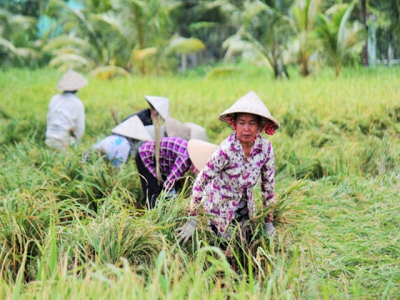Farmers rescue rice paddies following storm in Vietnams Mekong Delta

Women stand downed rice in a field in Tien Giang Province, southern Vietnam, November 27, 2018. Photo: Tuoi Tre
Many farmers in a coastal region of Vietnam’s Mekong Delta were busy on Tuesday saving their rice crops from the effects of a recent storm.
Nearly 10,000 out of 28,000 hectares of paddy fields in Tien Giang Province, about 70 kilometers south of Ho Chi Minh City, had rice downed by strong winds and heavy rain brought along by typhoon Usagi, according to figures by the provincial agriculture department.
While the storm, which caused a deluge in Ho Chi Minh City on the weekend, did not make landfall on Tien Giang, its location was close enough to wreak peripheral havoc on the rice crops here.
More rice fields were knocked down in areas nearer to the sea.
The impact was tremendous as most of the damaged crops were just under two weeks to harvest.

A farmer uses a diesel-powered machine to drain his paddy field in Tien Giang Province, southern Vietnam, November 27, 2018. Photo: Tuoi Tre

A farmer operates a pumping machine on his rice field in Tien Giang Province, southern Vietnam, November 27, 2018. Photo: Tuoi Tre
Many farmers said the blow was to cause losses, or break-even results in the most optimistic scenario.
To rectify the situation, they were utilizing machines to drain their fields and hiring laborers to tie rice in groups so that the plants could stand upright again.
The ‘rescue’ is crucial, given that ripe rice grains are likely to be damaged or produce seedlings when soaked.
Hiring the laborers meant the farmers had to cover greater costs, in addition to the expenses for pesticide and harvest, which make up a large part of their agricultural spending.
Có thể bạn quan tâm
 Vietnam's agricultural export value ranked 15th in the world: Deputy Minister
Vietnam's agricultural export value ranked 15th in the world: Deputy Minister Vietnam's total agricultural exports are ranked 15th in the world and its agricultural products are available in 180 countries and territories worldwide
 Agriculture restructures toward modernization and sustainability
Agriculture restructures toward modernization and sustainability Vietnam’s agriculture has helped stabilize the macro-economy, control inflation, generate jobs, reduce poverty, and raise Vietnam’s status internationally.
 Advanced technology remains key factor for boosting agricultural production
Advanced technology remains key factor for boosting agricultural production Hi-tech agriculture is considered key to the development of the agricultural sector and to increasing competitiveness in the international integration process